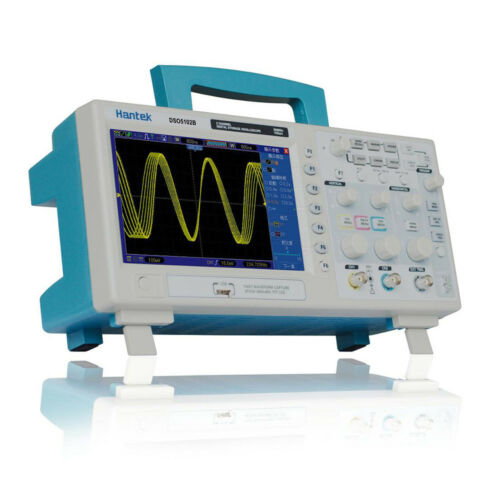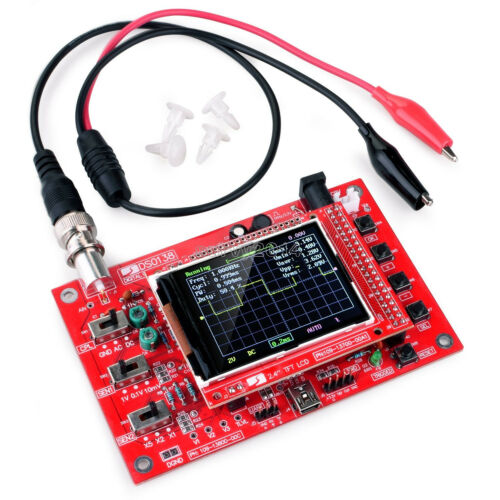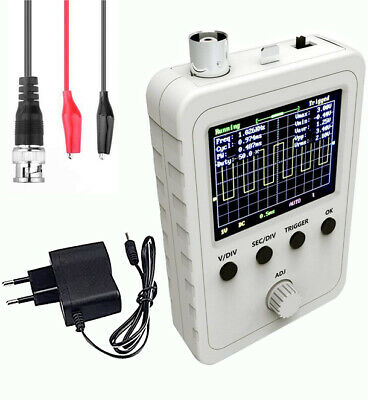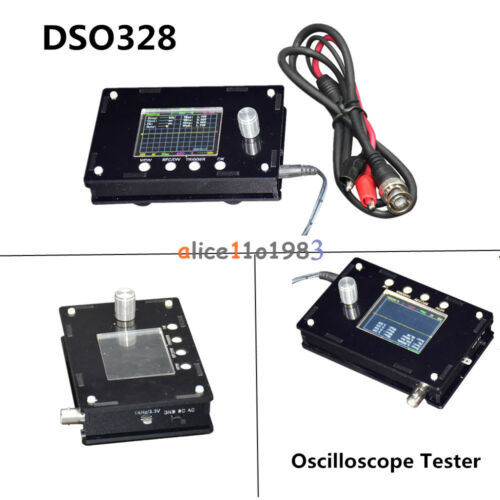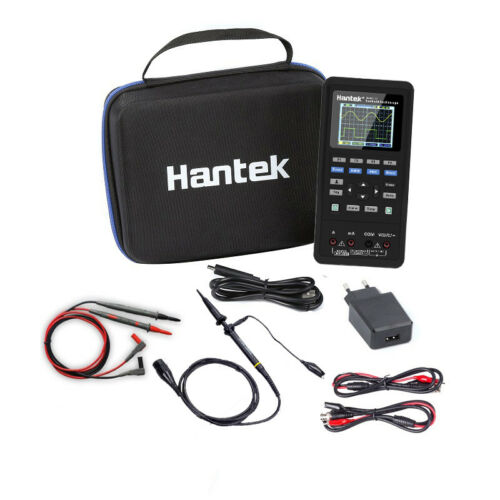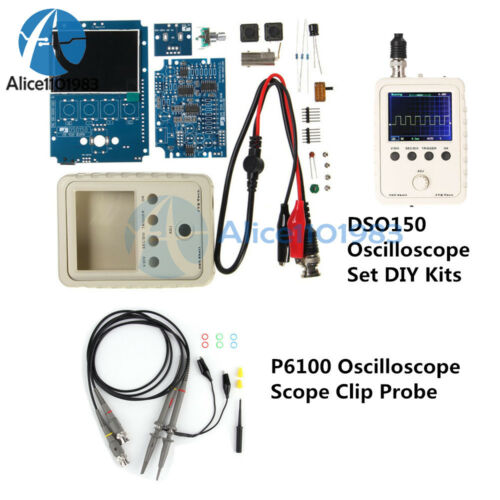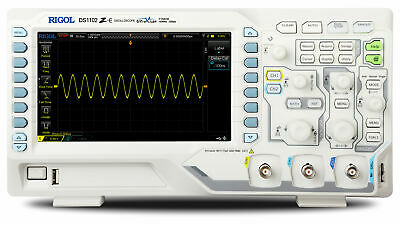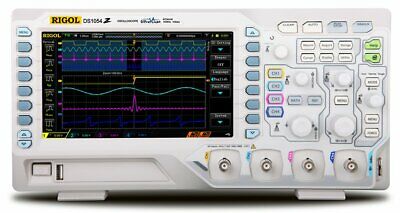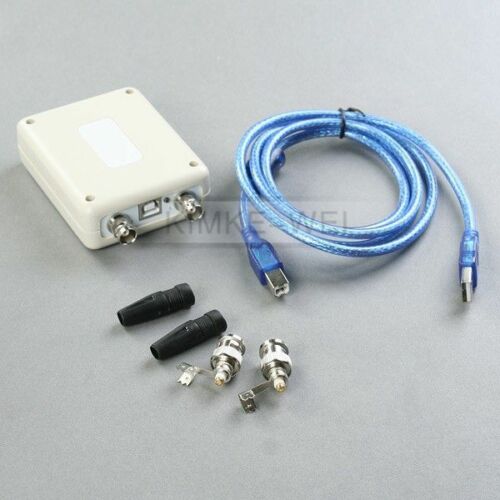-40%
Hantek DSO5102B Bandwidth 100MHz 1GS/s LCD 7" Digital Storage Bench Oscilloscope
$ 172.74
- Description
- Size Guide
Description
Hantek DSO5102B Bandwidth 100MHz 1GS/s LCD 7" Digital Storage Bench Oscilloscope1. Feature
100MHz bandwidths
1GSa/s Real Time sample rate
Large (7.0-inch) color display,WVGA(800x480)
Record length up to 1M
Trigger mode: edge/pulse width/line selectable video/slop/overtime etc.
USB host and device connectivity, standard
Multiple automatic measurements
Four math functions, including FFTs standard
Provides software for PC real-time analysis
VGA Optional
2. Specifications
Model
DSO5102B
Acquisition
Sample Rate
Real-Time Sample: 1GS/s
Acquisition Modes
Normal
Normal data only
Peak Detect
High-frequency and randon glith capture
Average
Wavefom Average, selectable 4,8,16,32,64,128
Inputs
Inputs Coupling
AC, DC, GND
Inputs Impendance
1MΩ±2% ‖20pF±3pF
Probe Attenuation
1X, 10X
Supported Probe Attenuation Factor
1X, 10X, 100X, 1000X
Maximum Input Voltage
CAT I and CAT II: 300VRMS (10×), Installation Category;
CAT III: 150VRMS (1×);
Installation Category II: derate at 20dB/decade above 100kHz to 13V peak AC at 3MHz* and above. For non-sinusoidal waveforms, peak value must be less than 450V. Excursion above 300V should be of less than 100ms duration. RMS signal level including all DC components removed through AC coupling must be limited to 300V. If these values are exceeded, damage to the oscilloscope may occur.
Horizontal System
Sample Rate Range
500MS/s--1GS/s
Waveform Interpolation
(sin x)/x
Record Length
1M
SEC/DIV Range
4ns/div to 40s/div
Sample Rate and
Delay Time Accuracy
±50ppm(at over any ≥1ms time interval)
Position Range
20ns/div to 80us/div; (-8div x s/div) to 40ms;
200us/div to 40s/div; (-8div x s/div) to 400s
Delta Time Measurement Accuracy
(Full Bandwidth)
Single-shot, Normal mode:± (1 sample interval +100ppm × reading + 0.6ns);
>16 averages:± (1 sample interval + 100ppm × reading + 0.4ns);
Sample interval = s/div ÷ 200
Vertical System
Vertical Resolution
8-bit resolution, all channel sampled simultaneously
Position Range
2mV/div to 10V/div
Bandwidth
100MHz
Rise Time at BNC( typical)
3.5ns
Analog Bandwidth in Normal and Average modes at BNC or with probe, DC Coupled
2mV/div to 20mV/div, ±400mV; 50mV/div to 200mV/div, ±2V
500mV/div to 2V/div, ±40V; 5V/div, ±50V
Math
+, -, *, /, FFT
FFT
Windows: Hanning, Flatop, Rectamgular, Bartlett, Blackman;
1024 sample point
Bandwidth Limit
20MHz
Low Frequency Response (-3db)
≤10Hz at BNC
DC Gain Accuracy
±3% for Normal or Average acquisition mode, 5V/div to 10mV/div;
±4% for Normal or Average acquisition mode, 5mV/div to 2mV/div
DC Measurement Accuracy,
Average Acquisition Mode
When vertical displacement is zero, and N ≥16:± (3% × reading + 0.1div + 1mV) only 10mV/div or greater is selected;
When vertical displacement is not zero, and N≥16: ± [3% × (reading + vertical position) + 1% of vertical position + 0.2div]; Add 2mV for settings from 2mV/div to 200mV/div; add 50mV for settings from 200mV/div to 5V/div
Volts Measurement Repeatability,
Average Acquisition Mode
Delta volts between any two averages of ≥16 waveforms acquired under same setup and ambient conditions
Trigger System
Trigger Types
Edge, Video, Pulse, Slope, Over time, Alternative
Trigger Source
CH1, CH2, EXT, EXT/5, AC Line
Trigger Modes
Auto, Normal, Single
Coupling Type
DC, AC, Noise Reject, HF Reject, LF Reject
Trigger Sensitivity
(Edge Trigger Type)
DC(CH1,CH2):
1div from DC to 10MHz; 1.5div from 10MHz to 100MHz; 2div from 100MHz to Full;
DC(EXT):
200mV from DC to 100MHz; 350mV from 100MHz to 200MHz;
DC(EXT/5):
1V from DC to 100MHz;1.75V from 100MHz to 200MHz;
AC: Attenuates signals below 10Hz;
HF Reject: Attenuates signals above 80kHz
LF Reject: Same as the DC-coupled limits for frequencies above 150kHz; attenuates signals below 150kHz
Trigger Level Range
CH1/CH2: ±8 divisions from center of screen;
EXT: ±1.2V;
EXT/5:±6V
Trigger Level Accuracy( typical)Accuracy is for signals having rise and fall times ≥20ns
CH1/CH2: 0.2div × volts/div within ±4 divisions from center of screen;
EXT: ± (6% of setting + 40mV);
EXT/5: ± (6% of setting + 200mV);
Set Level to 50%(typical)
Operates with input signals ≥50Hz
Video Trigger
Video Trigger Type
CH1, CH2: Peak-to-peak amplitude of 2 divisions;
EXT: 400mV;
EXT/5: 2V
Signal Formats and Field Rates, Video Trigger Type
Supports NTSC, PAL and SECAM broadcast systems for any field or any line
Holdoff Range
100ns ~ 10s
Pulse Width Trigger
Pulse Width Trigger Mode
Trigger when (< , >, = , or ≠); Positive pulse or Negative pulse
Pulse Width Trigger Point
Equal: The oscilloscope triggers when the trailing edge of the pulse crosses the trigger level.
Not Equal: If the pulse is narrower than the specified width, the trigger point is the trailing edge. Otherwise, the oscilloscope triggers when a pulse continues longer than the time specified as the Pulse Width.
Less than: The trigger point is the trailing edge.
Greater than (also called overtime trigger): The oscilloscope triggers when a pulse continues longer than the time specified as the Pulse Width
Pulse Width Range
20ns ~ 10s
Slope Trigger
Slope Trigger Mode
Trigger when (< , > , = , or ≠ ); Positive slope or Negative slope
Slope Trigger Point
Equal: The oscilloscope triggers when the waveform slope is equal to the set slope.
Not Equal: The oscilloscope triggers when the waveform slope is not equal to the set slope.
Less than: The oscilloscope triggers when the waveform slope is less than the set slope.
Greater than: The oscilloscope triggers when the waveform slope is greater than the set slope.
Time Range
20ns ~ 10s
Overtime Trigger
Over Time Mode
Rising edge or Falling edge
Time Range
20ns ~ 10s
Alternative Trigger
Trigger on CH1
Internal Trigger: Edge, Pulse Width, Video, Slope
Trigger on CH2
Internal Trigger: Edge, Pulse Width, Video, Slope
Trigger Frequency Counter
Readout Resolution
6 digits
Accuracy (typical)
±30ppm (including all frequency reference errors and ±1 count errors)
Frequency Range
AC coupled, from 4Hz minimum to rated bandwidth
Signal Source
Pulse Width or Edge Trigger modes: all available trigger sources
The Frequency Counter measures trigger source at all times, including when the oscilloscope acquisition pauses due to changes in the run status, or acquisition of a single shot event has completed.
Pulse Width Trigger mode: The oscilloscope counts pulses of significant magnitude inside the 1s measurement window that qualify as triggerable events, such as narrow pulses in a PWM pulse train if set to < mode and the width is set to a relatively small time.
Edge Trigger mode: The oscilloscope counts all edges of sufficient magnitude and correct polarity.
Video Trigger mode: The Frequency Counter does not work.
Measure
Cursor Measurement
Voltage difference between cursors: △V
Time difference between cursors: △T
Reciprocal of △T in Hertz (1/ΔT)
Auto Measuerment
Frequency, Period, Mean, Pk-Pk, Cycli RMS, Minimum, Maximum, Rise time, Fall Time, +Pulse Width, -Pulse Width, Delay1-2Rise, Delay1-2Fall, +Duty, -Duty, Vbase, Vtop, Vmid, Vamp, Overshoot, Preshoot, Preiod Mean, Preiod RMS, FOVShoot, RPREShoot, BWIDTH, FRF, FFR, LRR, LRF, LFR, LFF
Display
Display Type
7 inch 64K color TFT (diagonal liquid crystal)
Display Resolution
800 horizontal by 480 vertical pixels
Display Contrast
Adjustable (16 gears) with the progress bar
Probe Compensator Output
Output Voltage( typical)
About 5Vpp into ≥1MΩ load
Frequency(typical)
1kHz
Power Supply
Supply Voltage
100-120VACRMS(±10%), 45Hz to 440Hz, CATⅡ
120-240VACRMS(±10%), 45Hz to 66Hz, CATⅡ
Power Consumption
<30W
Fuse
2A, T rating, 250V
Environmental
Temperature
Operating: 32℉ to 122℉ (0℃ to 50℃);
Nonoperating: -40℉ to 159.8℉ (-40℃ to +71℃)
Cooling Method
Convection
Humidity
+104℉ or below (+40℃ or below): ≤90% relative humidity;
106℉ to 122℉ (+41℃ to 50℃): ≤60% relative humidity
Altitude
Operating: Below 3,000m (10,000 feet);
Nonoperaring: Below 15,000m(50,000 feet)
Mechanical
Size
Length 385mm, Width 200mm, Height 245mm
Weight
3.5KG(with Packing); 2.08KG(without Packing)
3. Package:
1 x oscilloscope;
1 x pair oscilloscope probe;
1 x power cable;
1 x CD (manual etc. inside);
1 x usb cable;
